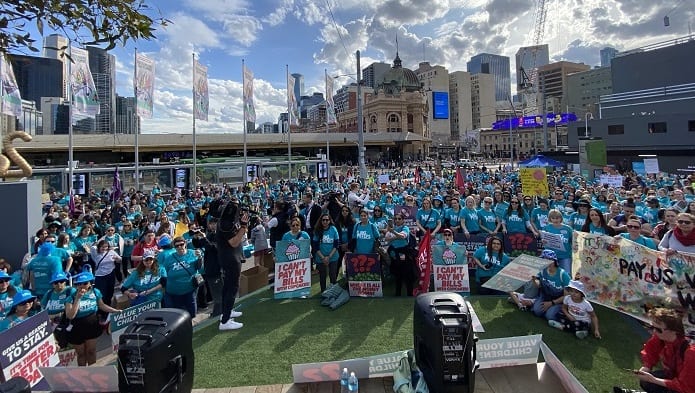Thousands of early educators walked out to join protests around the country on Wednesday, demanding pay rises, lower workloads and recognition for their skills.
Chants included “we’re educators, not babysitters” and “what do we want, a reason to stay”.
Rallies organised by the United Workers Union took place in every capital city as well as some regional centres.
UWU early education director Helen Gibbons described the shutdown as “the largest action of early educators that this country has ever seen”.
Alongside calls for a significant increase in wages, a popular demand was for early education to be run as part of the public system. As Mandy from a community-run centre told Solidarity in Melbourne: “Nobody should be making money out of early childhood. That’s so not right.”
In Melbourne, more than 1000 rallied. As well as UWU banners there were union flags representing the NTEU, AEU, CPSU, ASU and RAFFWU. Parents joined the rally with their kids to show solidarity.
Mandy added: “The whole early childhood education system is in absolute crisis. We can’t get staff—we’ve had to close some days. Staff don’t get paid enough for what they do. They don’t get the recognition for what they do.
“There’s not enough good-quality education out there to train educators. So everything needs to be changed. We need to change the funding and how it’s given to centres.”
Another Melbourne early educator, Margie, told Solidarity: “We need the government to step up and support early childhood education and care, and give the same value as given to all education.”
Really struggling
In Sydney, Ash said: “We are striking because the crisis in our sector is getting worse and worse every month. We are having huge staff shortages where some centres are at 50 per cent of their staffing. We are putting on this happy show for the parents but we’re really struggling.
“People don’t want to work in the sector anymore because we’re not getting paid enough, the conditions are not good enough and eventually the conditions are going to start impacting the children. Actually, it’s probably starting now. We want to stop it before it gets to that point where the children are the ones that are suffering in addition to educators.”
Shannon was at the Sydney rally and told Solidarity: “We’re constantly given more work. Every year there’s something new that we have to do and we’re not getting any recognition for it. We have a staffing crisis and we’re not getting any help.
“The only pay rise we had recently was from the government—everyone got a dollar more. At my centre we have only five permanent staff left. We have people leaving the industry completely after 14 years because they’re not getting any recognition for any of the work they’re doing.
“I’m only getting paid $25 an hour for all this work when I can get paid $35 somewhere else like a coffee shop.”
In Melbourne, Erin from Cardinia Lakes Early Learning Centre said: “We have 120 places a day, seven rooms, and that puts us under a lot of pressure. We’ve had shortages of staff, COVID.”
Her colleague Jo added: “Working can be very high pressure all of the time because of the short staffing. I personally would like a lower ratio with more staff, that’s my big thing.”
Nice ladies
Some protesters linked low pay in the sector with the fact that it’s an overwhelmingly female industry.
In Melbourne, Margey said: “A big thing is pay equity and pay parity. So our Cert IIIs are incredibly low paid, in the low $20s. That’s definitely due to the fact that it’s a genderised workforce.
“The sector is seen as nice ladies. Quite frankly, fuck the nice ladies bullshit.”
Ash in Sydney talked about mobilising for the rally. “Finding out about the action in advance, talking to all our educators and hyping them up, making them feel valuable, the fact we do have those staff shortages means every last one of us is so important. They are never going to threaten us or fire us for just standing up for ourselves.
“Once everyone realised their value we were all comfortable to walk out together. We didn’t really ask for permission. We just said ‘Hey, this is what’s happening on that day and all of us have already agreed we are not coming in’.”
The national mobilisation was a tremendous boost to the campaign. Now the challenge is to involve more early educators and step up the action to force a step change for the sector from Labor.
By David Glanz and James Supple






